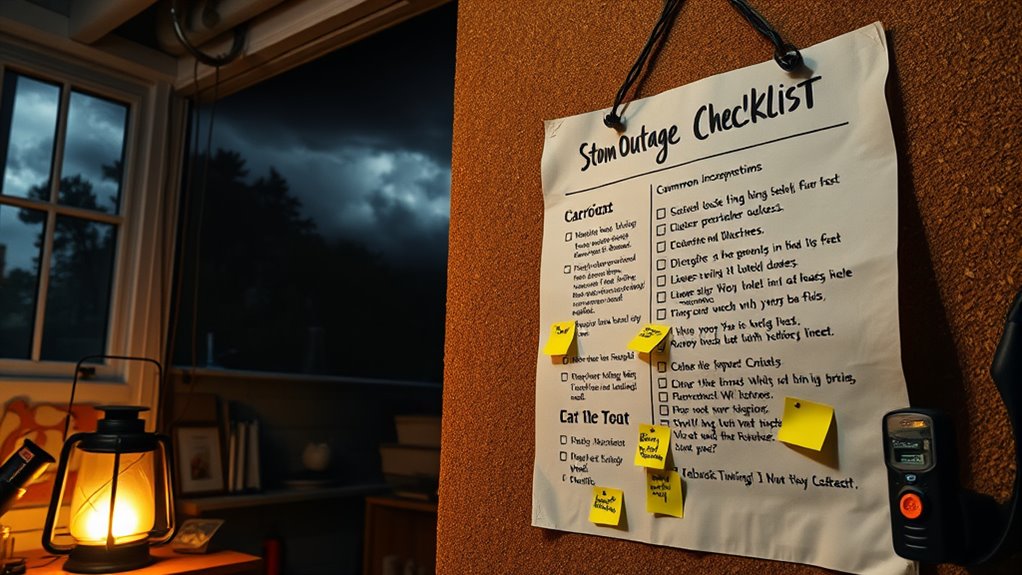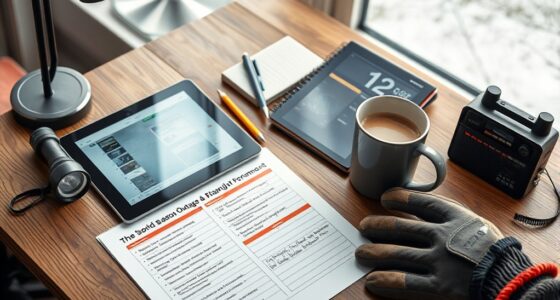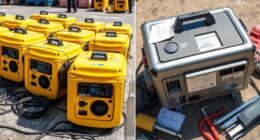Many people overestimate their battery needs, stockpiling more than necessary and wasting money. They also underprepare for long outages by neglecting essentials like water and non-perishable food. Assuming a generator can meet all your needs leads to mismatched capacity and wasted fuel. Forgetting essential communication devices, like radios and backup power sources, can leave you cut off. Additionally, skipping a family emergency plan causes chaos during disasters. Keep these mistakes in mind to stay prepared and discover more important tips ahead.
Key Takeaways
- Overestimating battery needs leads to waste; focus on devices that truly require power and calculate consumption accurately.
- Underpacking essentials like non-perishable food, water, and medical supplies can leave you unprepared for long outages.
- Selecting the wrong generator size can waste fuel or fail to power critical devices; proper assessment of needs is essential.
- Relying solely on cell phones ignores other vital communication tools like radios and satellite devices for emergency updates.
- Not having a family emergency plan causes confusion; regular practice and clear procedures improve safety and coordination during storms.
Overestimating the Need for Extra Batteries

While it’s tempting to stockpile a large number of extra batteries, many people tend to overestimate how many they’ll actually need during a storm outage. The key is understanding your device’s power requirements and battery capacity. Not all batteries are created equal—some may last longer based on their capacity, but buying too many can lead to waste. Focus on what devices you truly need to keep powered, like radios, flashlights, or medical equipment. Calculate the power requirements of each device and match them with appropriate batteries. Overestimating can clutter your supplies and drain your budget. Instead, plan thoughtfully, and stock only what you’ll realistically use, ensuring your batteries will be effective when you need them most. Being aware of battery capacity can help you make smarter choices and avoid unnecessary purchases.
Underpacking for Long-Term Outages

Focusing too much on packing the latest gadgets or a large supply of batteries can cause you to overlook the significance of preparing for an extended outage. To avoid underpacking, prioritize storage tips like stockpiling non-perishable food, bottled water, and essential supplies that last beyond a few days. Don’t forget to include items like manual can openers, batteries, and first aid kits. Power conservation becomes vital during long outages, so plan to minimize energy use—use lanterns instead of bright lights, and keep devices off unless needed. Consider how you’ll store perishables safely and conserve your resources over time. Remember, packing smarter now can make a significant difference when power is scarce, and resources are limited. Proper planning ensures you’re ready for the worst, especially when considering toilet functionality and other essential household needs during extended outages.
Assuming Generators Are a One-Size-Fits-All Solution
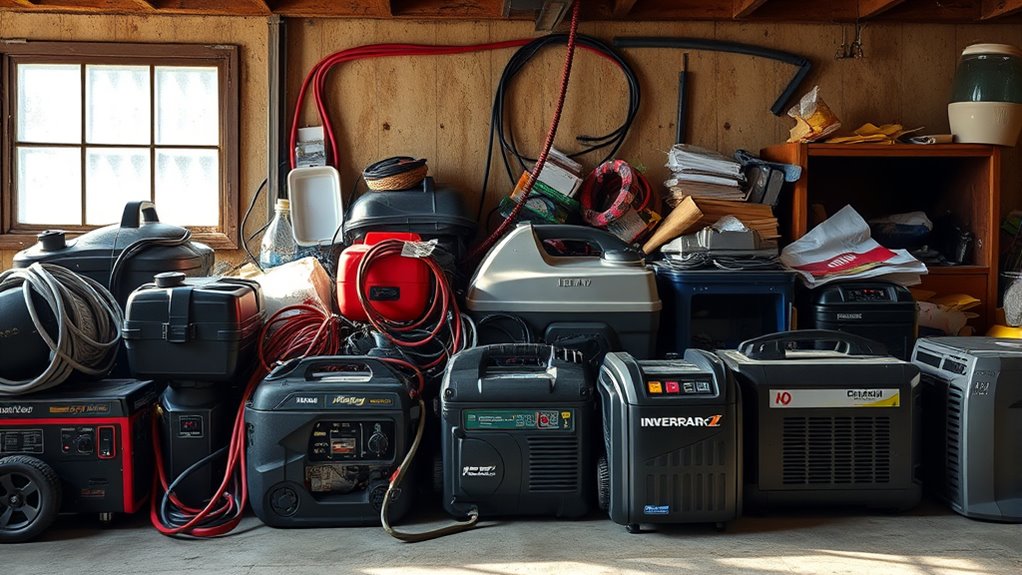
Many people assume that a single generator can meet all their power needs during an outage, but in reality, not all generators are suitable for every situation. Proper generator sizing is vital; a generator that’s too small won’t power essential appliances, while an oversized one wastes fuel and money. You need to assess your power requirements carefully to choose the right size. Additionally, don’t overlook the battery necessity—some backup systems rely on batteries for quick startup or supplementing power. Relying solely on a generator without considering these factors can leave you unprepared or overconfident. Make sure to evaluate your specific needs and select a generator that fits, and remember, sometimes batteries or additional power sources are just as important as the generator itself. Understanding wattage can help you better determine your actual power needs during outages.
Forgetting Essential Communication Devices
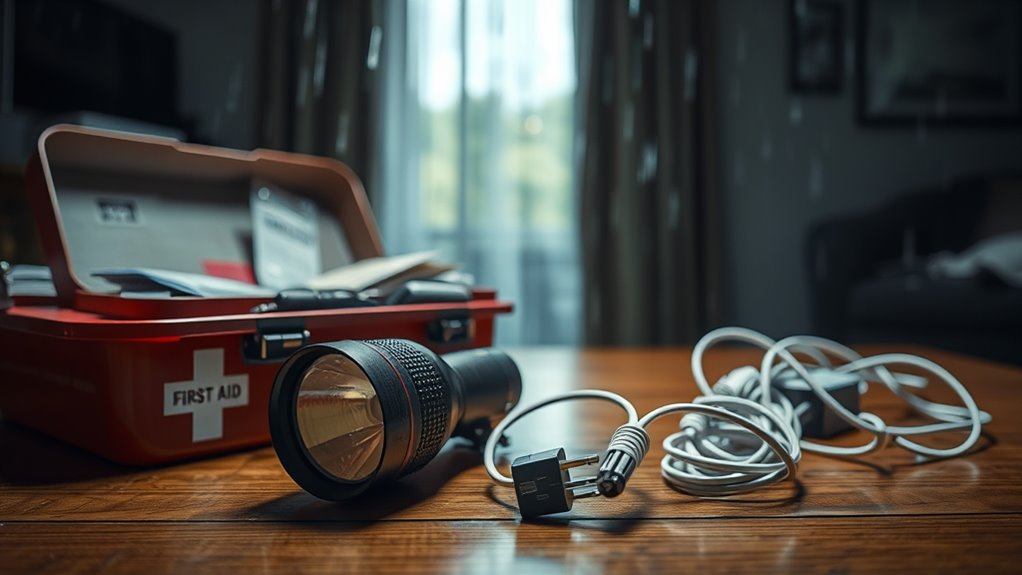
Neglecting to prepare essential communication devices can leave you stranded when power lines go down and cell towers fail. Relying solely on cell phones isn’t enough; you need alternative options. Consider investing in a battery-powered radio communication device for real-time updates. Satellite devices are vital if you’re outdoors or in remote areas where cell service drops. Make sure you have spare batteries or solar chargers for these devices. Don’t forget to test your equipment before storm season hits. Keep a list of emergency contacts stored separately from your devices. Additionally, familiarize yourself with how to operate your satellite device and radio communication tools. Proper air quality management during outages can help prevent health issues caused by poor indoor air conditions. These steps can make all the difference in staying connected and informed during outages. Stay prepared and avoid losing touch when it matters most.
Ignoring the Importance of a Family Emergency Plan
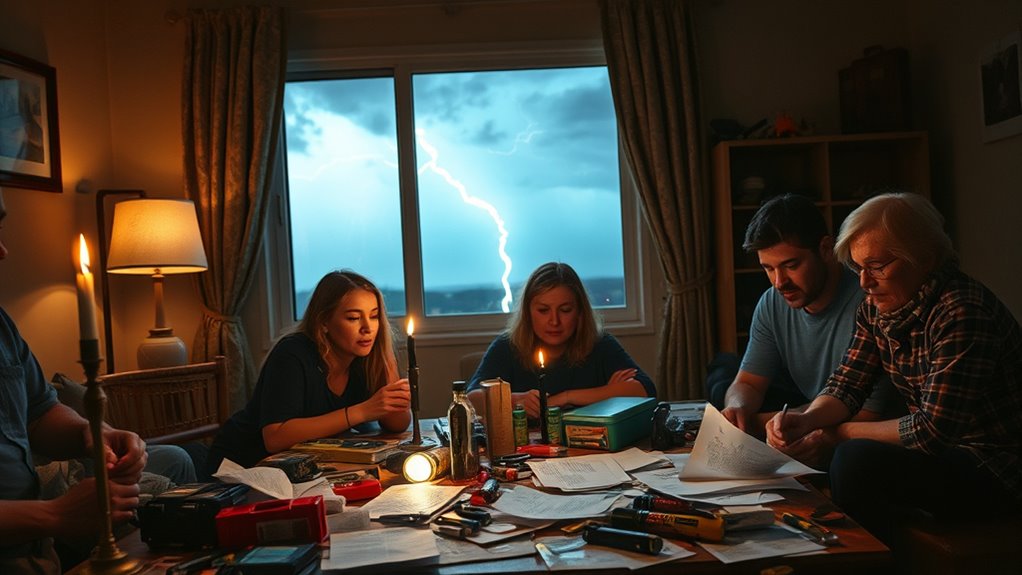
Without a family emergency plan in place, you risk chaos and confusion when disaster strikes. A solid plan ensures everyone knows how to stay safe and where to go, prioritizing family safety. It helps you coordinate emergency communication quickly and effectively, minimizing panic. Without it, family members may become separated or unsure of what to do, increasing danger. Developing a plan involves choosing a meeting spot, establishing contact methods, and assigning roles so everyone stays informed. Regular practice keeps everyone prepared and confident. Proper planning is essential for effective disaster response. Ignoring this step leaves your family vulnerable during storm season outages, putting safety at risk. Having a clear, communicated plan guarantees you can respond calmly and efficiently, reducing the chaos and helping protect your loved ones when disaster hits.
Frequently Asked Questions
How Many Extra Batteries Should I Realistically Store?
You should store at least four to six extra batteries for your storm season outage checklist, depending on your power needs. Proper battery storage is essential to prevent damage and guarantee longevity. When planning power, consider the types of devices you’ll run and their battery consumption. This way, you can confidently handle outages, knowing your backup power is sufficient, and avoid unexpected shortages during storms.
What Supplies Are Essential for a Week-Long Outage?
In a week-long outage, your emergency kit essentials are vital. Don’t fall for power outage myths that you only need a flashlight; include non-perishable food, bottled water, batteries, a first aid kit, and necessary medications. You might think you can survive on a small supply, but the real challenge is preparedness. Make sure your kit is ready—because when the power’s gone, it’s the little things that keep you safe and comfortable.
Are Portable Generators Suitable for All Home Sizes?
Portable generators aren’t suitable for all home sizes, as you need to take into account home size considerations and generator capacity limits. For smaller homes, a portable generator with adequate wattage can power essential appliances. However, larger homes may require a more powerful unit or a standby generator. Always assess your home’s energy needs and generator capacity limits to ensure safe and effective power during outages.
What Alternative Communication Devices Should I Consider?
You should consider solar chargers and two-way radios as reliable alternative communication devices during outages. Solar chargers keep your devices powered without electricity, ensuring you stay connected. Two-way radios allow instant communication with family, neighbors, or emergency services, especially when cell networks are down. Together, these tools provide dependable, eco-friendly ways to stay informed and connected, giving you peace of mind during storm season.
How Often Should I Review and Update My Family Emergency Plan?
You should review and update your family emergency plan at least once a year to make certain everyone stays prepared. Regular emergency drills help reinforce family safety and identify any gaps in your plan. As conditions change or new members join, update contact info, escape routes, and supplies. Staying proactive guarantees your family knows what to do during a storm, minimizing chaos and enhancing overall preparedness.
Conclusion
Don’t let common misconceptions leave you unprepared. Remember, a stitch in time saves nine—being proactive with your storm outage checklist can make all the difference. Overestimating batteries, underpacking, or relying solely on generators can lead to trouble. Stay ahead by planning for long-term outages, keeping communication devices handy, and having a family emergency plan. When it comes to storm season, preparation is key—don’t let assumptions be your downfall. Stay safe and ready!
